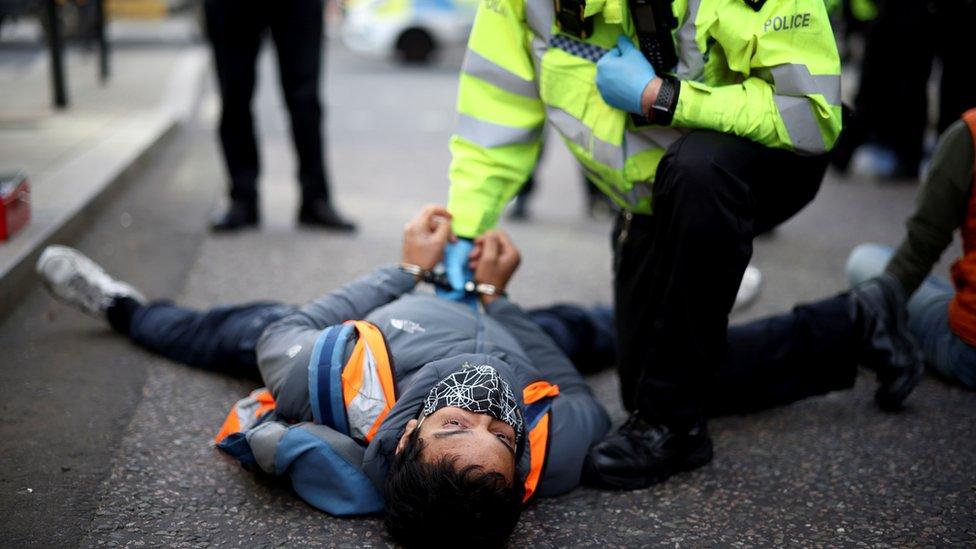Queen's Speech: Government tries again to ban 'guerrilla' protests
- Published

The government will try again to ban what it calls "guerrilla protests" through new legislation announced in the Queen's Speech.
The Tories tried to introduce measures in its policing bill aimed at those who glue and lock themselves to structures, but it was rejected by the Lords.
The new Public Order Bill revives the policies, which could see some protesters facing up to a year in jail.
Critics have called the plan "an attack on the right to protest".
But Home Secretary Priti Patel said ministers were determined to prevent protesters bringing the country to "a grinding halt".
The bill will create a new criminal offence of "locking on" and going equipped to "lock on" to other people, objects or buildings in order to cause "serious disruption" - appearing to target groups like Extinction Rebellion and Insulate Britain.
For this offence, there will be a a maximum penalty of up to six months' imprisonment, an unlimited fine, or both.
The sentence could be increased to 12 months under a new offence for interfering with key national infrastructure, such as airports or railways.
The bill will also make it illegal to obstruct major transport works, like HS2, also with up to six months in prison and/or the unlimited fine.
And it will extend stop and search powers linked to the new offences.


Hang on… haven't we heard this all before?
Yep - that's right - Priti Patel dropped it from the recent and mammoth Policing, Crime, Sentencing and Courts Act in the face of resolute opposition in the House of Lords.
"Locking On" has made recent headlines thanks to the imaginative yet disruptive protests from Extinction Rebellion.
But the tactic is as old as the hills.
What's not clear is why this government wants to make it a specific crime punishable by prison when their predecessors - Conservative and Labour alike - didn't feel it was a necessary punishment.
Ministers say the power is vital to help people go about their business by preventing demonstrators stopping trains, closing bridges and so on.
But Parliament has so far not been convinced - and the human rights group Liberty says it's a rehashed "power grab" from a government determined to shut down accountability.

Labour's shadow secretary for business, Jonathan Reynolds, questioned the priority of the move, given what he called the "collapse of the justice" system around sexual offences and fraud.
But his party colleague, Labour MP Bell Ribeiro-Addy, criticised the plan further, saying: "Instead of taking action to address injustices like racism and climate breakdown, they want to stop people sounding the alarm."
She was echoed by Green Party MP Caroline Lucas, who said: "This is not a public order bill - it's a public oppression bill.
"Our right to peaceful protest should be protected, not attacked. Shame on [the] government for bringing back these dangerous proposals."
But Chief Secretary to the Treasury Simon Clarke told BBC News the measures would crackdown on "illegitimate forms of protest", stopping the "absolute misery" they caused.
"People have the right to go about their business unimpeded," he said.